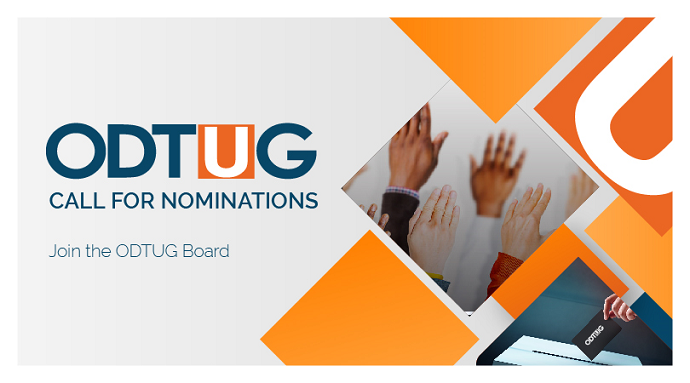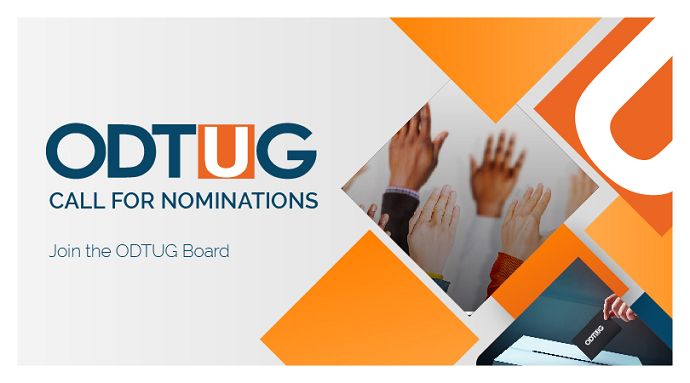Great news! We've extended the nomination deadline for the Fourth Annual ODTUG Innovation Award. The ODTUG Innovation Award honors excellence in creative, effective, and innovative use of Oracle development tools within ODTUG's supported communities (Analytics, APEX, Database, and EPM) or emerging technologies (Blockchain, AI, or IoT). The goal is to honor developers—individuals or teams—whose passion and creativity shine through in their application of Oracle Corporation technology to address real-world problems.
We are looking for innovative, exceptional, ahead-of-the-curve applications of Oracle development tools which stand out as examples of “the next big thing” in Oracle Corporation technology or as unusually creative applications of new and emerging Oracle tools. Nominees must be projects that go beyond implementation of a new tool or feature —what did you do that is unusually creative or innovative to achieve Oracle awesomeness?
To make a nomination for the award, you must be an ODTUG member (Associate or Full). If you are not a member, join now.
Nomination Criteria
- Nominees may be individuals or teams.
- Nominees do not need to be ODTUG members, but they must work with a tool that supports at least one of our communities (Analytics, APEX, Database, and EPM).
- Open-source and/or collaborative efforts are eligible.
Nomination Deadline: Friday, May 17, 2019 11:59 p.m. EDT.
Submit Your Nomination Form Here
Member Voting
For the second year in a row, we are bringing back member voting! We want YOU to help decide the 2019 Innovation Award winner. Member voting will be combined with judges' scoring to determine an overall Innovation Award winner.
Member voting will open on Tuesday, May 21, and will remain open until Monday, June 3. To vote, you must be an ODTUG member (Associate or Full). If you are not a member, join now.
At the close of the Innovation Award nominations, members will be emailed voting instructions. One vote per member, please.
Judging
The 2019 ODTUG Innovation Award winner will be selected by a team of ODTUG experts who will review all of the nominations and grade them according to these general topics:
- Innovation – The "wow" factor; acknowledges the exceptional and innovative.
- Quality – Not only does it have to be "wow," but it has to work.
- Applicability – Evaluates subject matter importance, completeness, effectiveness, and accuracy.
- Topic merit – Treatment of a cutting-edge topic, technical complexity, or new and unique approach to a common problem.
Innovation Examples
An excellent example of an Innovation Award nomination is our 2018 Innovation Award Winner: ![]() Stewart Bryson
Stewart Bryson
Project URL: https://github.com/RedPillAnalytics/checkmate-examples
Innovation: Why is this solution innovative? List out how this project is innovative and helping lead and define Oracle technologies.
The motivation for building Checkmate was to support basic software development lifecycles and workflows with Oracle Analytics development. This meant supporting real continuous integration and continuous delivery pipelines. To do that, we needed to address the following feature gaps:
- Offline Metadata Development: Developers are unaware if their changes even work. Working on the OBIEE metadata repository in offline mode is similar to spending hours working on an SQL script without ever executing it. Developers need to build analyses against the metadata repository to properly unit test their content, which is an important part of any lifecycle.
- Separate Metadata and Catalog Workflows: The only way to achieve real speed and agility is to combine metadata and catalog development in a single feature, which is represented as a single feature branch in Git.
- Manual Regression Testing: Human beings are incapable of providing comprehensive test coverage. Machines do this much better, so Checkmate needed a real testing framework.
- Waiting Until QA to Test: Testing aggregate development from numerous developers once a release makes it difficult to perform root cause analysis. The process should fail early.
- Manual Code Merges: Releases are merged and packaged manually only at release time.
- Manual Migrations: Environmental changes are made manually using GUI tools for each downstream environment.
- Manual Versioning of Deployment Artifacts: Human-centric processes are required to capture versioned deployment artifacts.
But now there is a better way. Checkmate is a product, and also a process, for addressing all of these challenges. In fact, the name is a hybrid of “check-in” and “automate,” two key principles for how Checkmate operates. It includes two pieces: Checkmate Studio and the Checkmate Build Framework. Checkmate Studio is a JavaScript-based client written using the Electron, while the Checkmate Build Framework is a build and test framework written using Gradle. Checkmate provides the following features:
- Real Multi-User Development: Developers work in isolated, fully functioning workstations and commit to isolated feature branches. The role of merging code is managed by a downstream, Git-based process. Developers develop—period. Checkmate Studio manages source control integration for OBI developer workstations by seamlessly exporting and importing content to and from Git branches. Full workstations allow for unit testing, as well as combined metadata/catalog workflows.
- Regression Testing Framework: Checkmate provides a full testing framework, which provides regression test capabilities during the development lifecycle and smoke or integration testing as part of the deployment process. The Checkmate testing framework generates JUnit results files, which all CI/CD servers support. Developers create regression tests as part of new development, which are OBIEE analytics identified as tests. Isolated branches are tested before code is merged back into integration branches. Failing early means fixing early. Immediate errors are fixed immediately.
- On-Demand Releases: Checkmate makes it simple to deliver daily or even hourly releases automated by a simple merge into a master branch in Git. Individual feature branches can be cherry-picked for releases, which makes it easy to release code even when users haven’t accepted individual features. The automated build process publishes and versions Apache Maven-compatible artifacts for push-button deployments downstream. Automated regression testing eliminates 80% of the Q&A process, while smoke-testing can be combined with automated deployments and automated rollbacks.
Checkmate provides the following results to Oracle Analytics environments:
Impact on Developers
- Productivity increases using full workstations
- Source control insulates against human error
- Checkmate Studio manages integration with source control
- Developers develop—period
Impact on Consumers
- Rapid release of curated content
- Decreased outages for content migration
- End-to-end transparency of feature development
- Increased accuracy and consumer confidence
Additional information about the project and/or team members.
Additional contributor: Emily Carlsen.
Click here for a full list of 2018 nominations.





